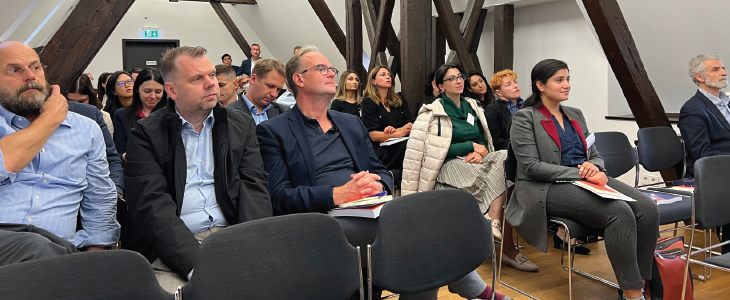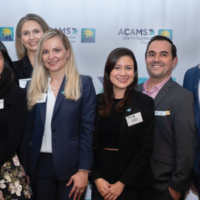
In 2022, the ACAMS Germany Chapter hosted four online and two live events on a range of topics, including regulatory developments and new approaches to mitigating financial crime more effectively using an intelligence-led approach. Given the major regulatory developments in the crypto space, our first two live events, which took place toward the end of the year in Frankfurt and Berlin, focused on the nexus of the crypto regulation to anti-financial crime (AFC), bearing in mind what can be expected when the European Union’s Anti-Money Laundering Package (EU AML Package) comes into force.
We also hosted an informal get-together in one of Berlin’s nicest outdoor summer bars (Prater Biergarten), with the international community of young and dynamic AFC professionals who have made Berlin their home as attendees.
The following summaries are the main details of the events and key points of discussion which came out of our knowledge-sharing events.
- January—Regulatory transformation and regulatory strategies
The event discussed the state of play regarding the regulatory landscape of the European Union (EU), including the Transparency Register and Financial Information Act, as well as the upcoming Sixth EU Anti-Money Laundering Directive and the EU money laundering regulation. The focus of the event was customer verification obligations (know your customer processes) and the complexities attached, such as the trustworthiness of information and the beneficial owners 25% threshold, which will apply at every shareholding level for both capital and voting shares. Previously, this threshold only applied to the first level of shareholding. Furthermore, experts discussed the role of the transparency register in light of the new regulations with a specific focus on register networking and digitalization. The discussion focused on what strategies can support obliged entities in achieving an optimal regulatory fit. - February—Germany’s approach to PPP—How banks and law enforcement can cooperate to improve AFC efforts
Experts from the banking, nonfinancial sector and the public sector discussed how effectiveness in financial crime prevention can be increased through domestic and international public-private partnerships (PPPs) and the exchange of knowledge and information. The speakers presented the development of the Anti-Financial Crime Alliance in Germany and the transnational experiences within the Europol Financial Intelligence Public Private Partnership (EFIPPP). Besides explaining what PPP initiatives are currently up and running and what kinds of activities they are engaged in, the panelists discussed how PPPs could support in adding value to efforts aiming to curtail financial crime, in particular in the area of information sharing. Every year, banks spend billions of dollars on core financial crime compliance systems and are filing more suspicious activity reports (SARs) than ever. Despite these process improvements, the global anti-money laundering (AML) regime does not appear to be substantially more effective. Surveys of past and present heads of national financial intelligence units (FIUs) indicate that only a relatively small handful of SARs are of immediate value to law enforcement (LE), whereby acknowledging that any SAR that is not of immediate value could still become valuable in the future, given that investigations often develop over the course of many months and years. While some FIUs data mine all their SARs to uncover trends and typologies or to develop new insights into networks that are only made clear after the SAR is placed in context, many do not, thus highlighting the importance of ongoing exchange in the context of PPPs. - March—Financial crime risk assessment: Re-thinking the approach
This event discussed financial crime risk assessments, looking at the challenges with the “as-is” approach and gathering opinions on where we can go from here. The panelists spoke about the challenges with static risk assessments and shared best practices on how to move to a more dynamic approach, to move the industry toward risk assessments with clear and actionable outcomes. An important point was noted that the key purpose of a money laundering risk assessment is to drive improvements in financial crime risk management by identifying the general and specific money laundering risks a financial institution (FI) is facing, determining how these risks are mitigated by a firm’s AML program controls and establishing the residual risk that remains for the FI. Discussions around emerging technology can support driving an intelligence-led approach to AFC to meet the shift in the requirements linked to risk assessments at the level of the obliged entities following the implementation of the EU AML Package. - April—Intelligence-led financial crime risk management
The experts of this event outlined the core objectives of an intelligence-led approach; examined the role of technology and innovation, especially the use of open-source intelligence and network analytics; and provided perspectives from AFC/AML practitioners regarding the challenges and benefits of developing dedicated financial intelligence and investigations units. The speakers explained what “intelligence-led” means and why it can help us to improve our approach to AFC. The term was introduced some 20 years ago by LE agencies to more effectively counter serious and organized crime. Promising results in recent years have prompted LE authorities to expand the intelligence-led proactive methodology by focusing on the systematic gathering and evaluation of data and information through a defined analysis process, thereby turning intelligence into strategic and operational analysis, which then serves as the basis for improved, informed and evidence-based decision-making. - September—AFC framework and digital assets
Experts presented the current state of AML/counter-terrorist financing (CTF) regulation of digital assets and how it will impact AFC programs going forward. The experts discussed markets in crypto-assets (MiCA) and the Travel Rule World, as well as the Basel Committee on Banking Supervision (BCBS) and sanctions topics related to non-fungible tokens. The panel spoke about the finalization of several regulatory initiatives at the European and international levels that would lay down the broader regulatory framework under which crypto activities are allowed and how banks should manage the risks they pose. Within the EU, the council presidency and European Parliament had reached a provisional agreement on the MiCA proposal, which would bring crypto-assets under a regulatory framework. BCBS was close to issuing detailed rules on the prudential treatment of such exposures in due course. The German authorities’ drive to legitimize the digital asset landscape and integrate it into the financial markets and Germany’s Federal Financial Supervisory Authority’s (BaFin) leading role in applying existing financial market law to crypto—and Germany—was also discussed. - November—Transfer of funds regulation, German crypto-assets transfer regulation and EU AMLD
At this event, the latest regulatory developments and how they will impact AFC programs going forward were discussed. The occasion took place at a very interesting time for the crypto sector in Germany and across the EU and the U.S. While the FTX crash dominated the headlines since it filed for bankruptcy on November 11, a lot of uncertainty has been created in the market. At the same time, more positive developments had taken place in the crypto space toward the end. Besides the passing of the EU’s MiCA, the U.S. announced the release of a “Comprehensive Framework For Responsible Development of Digital Assets,” and the Organisation for Economic Co-operation and Development published the final Crypto-Asset Reporting Framework for the automatic exchange of information between countries on crypto-assets. The experts noted that these regulatory frameworks will empower regulators to pursue investigations and enforcement actions against unlawful practices in the digital assets space. The discussion also revolved around licenses issued by BaFin to Coinbase and BitPanda, the Austrian crypto exchange. Beyond that discussion, the experts went over the market solutions that will facilitate the implementation of the Travel Rule that is underway and whether an EU standard for implementing the Travel Rule is necessary or the industry itself should build a SWIFT system for the transfer of crypto-assets. Finally, discussions around the day-to-day monitoring of crypto-assets transfers and blockchain analytics tools took place.
A big thanks go out to our sponsors Acuminor, Blackdot Solutions, Berlin Risk, Chainalysis, Validatis and YPO; our media partner, the Compliance Channel; and our speakers:
- Dennis Hannemann, head of Regulatory Strategy, Validatis
- Lora von Ploetz, head of Global Financial Crime Unit, Commerzbank
- Tommas Kaplan, head of Compliance, von Poll Immobilien
- Eric van der Schild, chair, EFIPPP Steering Group
- Martin Nordh, CEO, Acuminor
- Stephan Niermann, director of Group Compliance, N26
- Charles Brown, head of Community, Blackdot Solutions
- Nana Heider, head of Financial Crime Intelligence Unit, Deutsche Bank
- Haibo Zhang, former global head of Applied Analytics, HSBC
- Janet Ho, head of EU Policy, Chainalysis
- Nico Di Gabriele, senior team lead, European Central Bank
- Peter Grosskopf, co-founder/CTO, Unstoppable Finance
- Peter Müller, financial crime officer, UBS
- Dr. Carola Rathke, partner, YPOG
- Dr. Anika Patz, senior associate, YPOG
- Barbara Foertsch, compliance officer, Solarisbank
- Stefano Bovo, money laundering reporting officer, Coinbase
For additional information on Germany Chapter events, membership details and upcoming events, please visit the ACAMS Germany Chapter page: http://www.acams.org/acams-chapters/germany.
To contact the chapter directly, email germanychapter@acams.org. In addition, an overview of activities by the ACAMS Germany Chapter since 2016 can be found at: http://www.acams.org/acams-chapters/germany.
Jennifer Hanley-Giersch, CAMS-Audit, managing partner, Berlin Risk Advisors GmbH, Berlin, Germany, jennifer.hanley@berlinrisk.com










